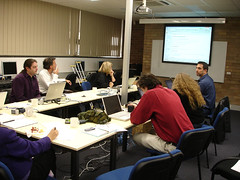Networking with the teacherConnect team
 A bunch of us headed off down to Wollongong on Wednesday, 5th July to be a part of the first meeting for the teacherConnect Project in Wollongong.
A bunch of us headed off down to Wollongong on Wednesday, 5th July to be a part of the first meeting for the teacherConnect Project in Wollongong.The teacherConnect Project is a NSW LearnScope 2006 project being led by staff from the Teaching and Learning Resource Unit, TAFE NSW, namely Steven Parker, Jo Kay and Les Tasker, who are also members of the CLC.
It is described on their blog as 'An open, global network of educators supporting each other in furthering our professional development and making sense of rapid changes in technologies for teaching and learning'.
We went there to share progress of our projects and to discuss ways we can network our projects together.
Jo Kay talked about their metal:ED project which 'is focused on empowering teachers of Metal Fabrication and Welding to produce their own Video based resources'.
Stephan Ridgway and Diana Khabbaz talked briefly about their LearnScope project - Teaching and Learning in a Networked World which 'seeks to engage management and educational decision makers in the debate around web2.0 and the networked learning model'.
Robyn Jay - NSW LearnScope Manager - was there. She has written her reflections on the day on the LearnScope blog - Connections and Conversations - in this post - Networked Learning in Action.
Also there were Alexander Hayes, James Worner and Julie Collareda.
Leigh Blackall was there in spirit, or at least via a Breeze virtual conferencing session, for some of the discussion.
Even though this project is about using online technologies to communicate and form learning networks, sometimes I still need to have conversations in person to process my thinking, so the meeting was a great opportunity to discuss some of the challenges in facilitating this project.
This lead to a valuable discussion on the tensions that exist in facilitating this type of project and actually putting the principles of a networked learning model into action.
Issues raised:
1) To what extent should the process be managed and controlled as opposed to offering encouragement and guidance? What is the right balance to ensure outcomes are achieved?Unlike an EdNA group where you can ensure everyone is informed of what's happening by subscribing everyone to the news forum, and where you can see how many people are subscribed and how much activity is going on, involvement in this network is purely voluntary - we can't force people to subscribe to this blog and other blogs, or post on their blogs or comment on others' blogs - so there is a fear that no one will participate, that project outcomes will not be achieved, and that the amount of activity related to the network cannot be measured.
2) To what extent are the facilitators responsible for providing learning experiences, resources and content, as opposed to encouraging the participants to provide resources and content?
3) To what extent should learning experiences be presented in a sequential manner, considering the network environment is a non-linear environment, and that if participants are expected to contribute the content it's likely to arrive in a non-sequential manner?
Personally, I'm learning what a challenge it is to put the new model into practice and relinquishing some control over the process and be less of an expert, more of a facilitator. It forces me to really think and act differently. It requires a real mind shift and can really 'do my head in'. It actually requires me to be different.
Steve Parker showed us a video of a pretty inspiring talk by Sir Ken Robinson in which 'he makes an entertaining (and profoundly moving) case for creating an education system that nurtures creativity, rather than undermining it.'
Jo Kay has posted a great flickr slideshow of pics from the day on the teacherConnect blog.
(Photo by Robyn Jay)

0 Comments:
Post a Comment
<< Home